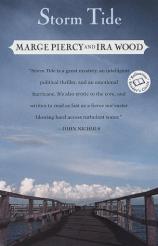Reading Group Guide
Discussion Questions
Storm Tide

1. Finding just the right title for a work of literature is important. Why Storm Tide? How do weather and seasonal changes function as metaphor in this novel?
2. Think about the places central to the novel. Which are most significant? Why?
3. Consider the importance of colors and textures in the authors' description of characters and places, including the names given to them.
4. Cooking and eating appear again and again in the novel. How does food help shape our understanding of the characters? Is it at all metaphorical?
5. In chapter 1, David tells us, "More than anyone I've ever known, Judith loved rituals." He's speaking specifically of the traditions of Judaism, but how is this insight into her also key to the novel's intricacies?
6. How does the convoluted time structure of the novel affect our experience of the events? How does the movement between first person and third person affect the flow of the narrative and our identification with the characters?
7. The novel's structure is a dance among the central characters' lives. How does this kind of shifting work for you? How would the book be different if it were David's monologue throughout, or entirely from Judith's point of view? Can you imagine the whole story being told from Crystal's perspective, or Gordon's, or Johnny's, or even Holly's or Laramie's or Mattie's?
8. Chapter 1 ends with David's claim that he is telling this story in order to understand what happened, in order to determine the cause of death for something that had once been alive. To what and whom might he be referring, besides Crystal?
9. Judith felt invisible--"a shameful secret"--when she was a child. David has felt invisible since his glory days as a baseball player. Who else in the novel struggles with invisibility? What does it mean to be acknowledged, accepted, "validated" in life? Ira Wood has said that David is an "outsider" in Saltash. Who else is, and why? What does it mean to be "part" of a town, to "belong" there?
10. Compare Saltash to your own town or city. Do the people around you resemble any of the characters? What political issues are alienating and allying members of the community? Can Saltash be considered a microcosm of the human race, or are its stories determined by its being a small New England town?
11. How many--and what kind of--love stories help to shape this book? Compare and contrast: (1) David's love for Judith and his love for Crystal; (2) Judith's love for Gordon and her love for David; (3) Crystal's love for Laramie and her love for David. How much self-love do these characters--and others--have?
12. What is the weight and pull of money in each of the central characters' lives?
13. David does a pretty thorough job of telling us and showing us his weaknesses, while his early assessment of Judith is that she is "miniature perfection." What are Judith's weaknesses? How does David's assessment hold or change as he gets to know her? Given your insights into her through the narrator, what is your assessment of her?
14. Could Crystal's death be considered a kind of murder, as David seems to feel? How might her accident be suicide? Might some readers view her fate as a just punishment for immoral behavior? Might others be glad she was put out of her misery as an unenlightened woman? Could some see her as the most virtuous character of all? How do you feel about her and her fate?
15. At one point Crystal calls herself an "anything girl." How might David be an "anything boy"? Could Judith ever be considered an "anything woman"?
16. While visiting France as a young woman, Judith committed herself to work hard to achieve "a graceful life . . . that satisfies the senses and the brain." Did she realize her dream, with Gordon? Might David have a similar dream? What is your definition of "a graceful life"? Do you long for one? Have you achieved one?
17. Consider the importance of past and present family members to the central characters. What kind of family life can you imagine Judith and David forging, if they do get back--and stay--together? After talking with her dying father, Natasha tells her stepmother that Gordon "wants to have an afterlife" in Judith's life. His hopes for Brian did not work out, but what about his role in bringing Judith and David together? Will his "ghost" always make a ménage à trois in the Compound?
18. Both Marge Piercy and Ira Wood have expressed concern that a co-authored novel is judged as inferior by many because it does not offer a singularity of vision. What has been your experience in reading this book's duality of vision?
Storm Tide
- Publication Date: December 7, 1999
- Paperback: 320 pages
- Publisher: Ballantine Books
- ISBN-10: 0449001571
- ISBN-13: 9780449001578







